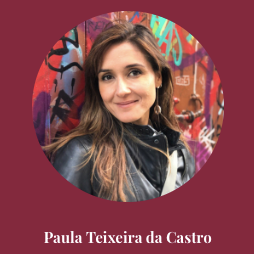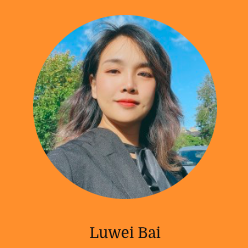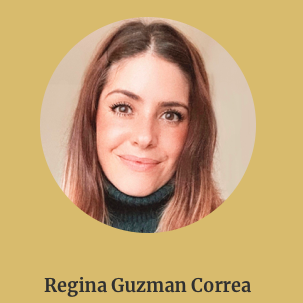The Cambridge Latin American Research in Education Collective (CLAREC) aims to constitute a space for Latin American perspectives that brings together researchers working on Latin American contexts and all those interested in hearing more about it. It aims to make visible the region’s knowledge production and current debates linked to education research towards the diversification and decolonisation of academia.
CLAREC, November 16, 2020
Introducing the Special Issue ‘Paulo Freire – Global Educator’: A conversation between the guest editors – Alexandre Da Trindade, Susan L. Robertson, and Carlos Alberto Torres – and the contributing authors and CLAREC members: Rocío Fernández Ugalde, Paula Castro, and Juliana Spadotto.
CIES 2024 Panel Session: “Making visible the unseen: Interrogating Education in Latin America through Feminist and Intersectional Lenses” with CLAREC members: María Fernanda Rodríguez, Rocio Fernandez Ugalde and Anna Maria Del Fiorentino
NEW BOOK! Reading Group: “The Falling Sky: Words of a Yanomami Shaman” by Davi Kopenawa & Bruce Albert. Online | Portuguese & Spanish | Supported by CLAREC and Universidade Emancipa | Click here to register.

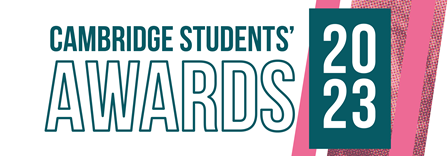
II Freire Conference: Building the bridge between popular education and university named Event of the Year by the Cambridge Students’ Awards 2023



On the afternoon of Friday, June 16, 2023, at the Graduate Hotel in the city of Cambridge, England, the first student awards ceremony organised by the Cambridge Student Union (Cambridge SU) took place. The event began with a reception in the hotel gardens on the banks of the River Cam to share with other students and student organisations, who were nominated for their local and international work and contribution. The “II Freire Conference: Building the bridge between popular education and university” was nominated for the category of “Event of the Year” by two professors from the Faculty of Education, University of Cambridge and evaluated by a committee.
The “II Freire Conference: Building the bridge between popular education and university”, organised by the Cambridge Latin American Research in Education Collective (CLAREC) and Universidade Emancipa, took place between the 17th and 21st of October 2022. It was an international, multicultural, and interdisciplinary initiative organised by a collective of people based in multiple academic institutions and social movements.
Two members of the Cambridge Latin American Research in Education Collective (CLAREC) were present at the ceremony. Rocío Fernández Ugalde, on the right of the photo, who is one of the founders of CLAREC and worked on the mobilisation of networks for the conference, and Heidy M. Perez-Cordero, on the left, who was in charge of the “Building Community Day” held at Homerton College at the University of Cambridge.
Heidy shares her experience during the event.
“Cambridge SU surprised the nominees by reading a profile of who would be the winner for each category. It was exciting to hear the description and realise that they were talking about your event who just won the prize. Tears welled up because the II Freire’s Conference was the result of the love, true solidarity and dedication of many people. Walking down the middle of the aisle to pick up the trophy and certificate was like walking with each one of the people who worked hard and are highly dedicated in promoting and practising popular education, democratic education, and social justice (Universidade Emancipa, CLAREC, UFRJ, Instituto Federal Rio de Janeiro, Acao Educativa, Instituto Paulo Freire, CLACSO & the Faculty of Education, University of Cambridge, among others). We walked that distance for every Latin American who has never been recognised in this very Eurocentric part of the world”
Rocio shares her experience during the event.
“When we plan the conference we do not intend much recognition from the University. The main purpose was to transform – even a little – the way in which the academic world (and in particular Cambridge) relates to other forms and spaces of knowledge production in order to build bridges based on solidarity. During the Student Union ceremony, I realised how significant it is to give visibility to initiatives that look beyond the pre-established order and imagine new spaces so these can be amplified”.
After the award ceremony, two students approached CLAREC members to congratulate them. Both participated in the Building Community Day. One highlighted the need to hold events like this in spaces where interaction with people not involved in academia is not encouraged enough. The other student, who is Colombian, said she was proud of the collective for representing and bringing Latin America to the University of Cambridge.
It should be noted that community leaders both in Cambridge and in Brazil were a key contribution to the success of the II Freire Conference, since they are the ones who keep the practice of popular education and the sense of social justice alive generation after generation.
To view photos and videos of the event, click here, and to learn more about this initiative, access the news article published by the Faculty of Education titled “Could a Latin American-style community takeover inspire new solutions in Britain’s least equal city?”
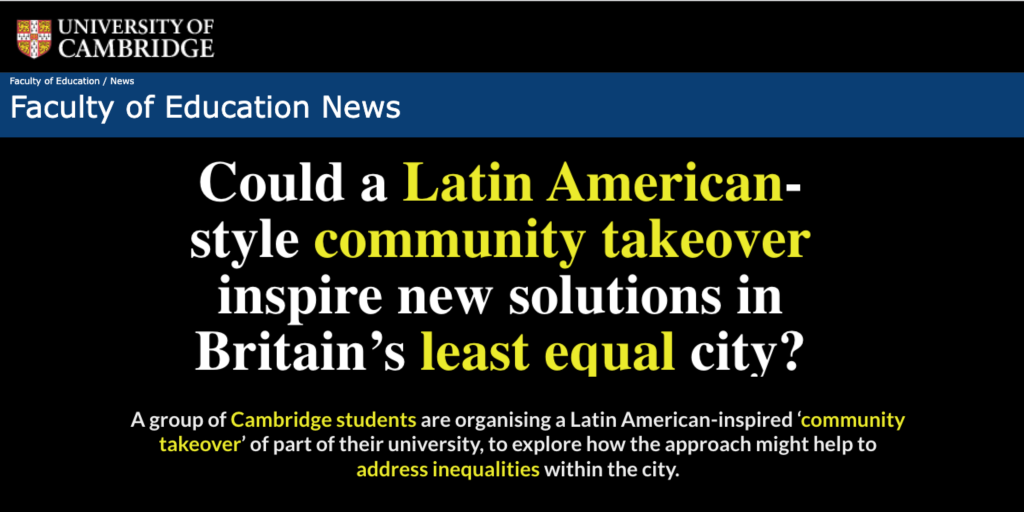
New paper! Want to know about CLAREC researchers and their new publications? Click on the banners below to access the paper.










The commemoration of the International Women’s Day 2023
By Heidy M. Perez-Cordero

This year, to commemorate International Women’s Day (IWD, 8th March 2023), I had the honour to organise and MC the inaugural CLAREC “Speed Research” event. Rocío Fernández, a founding member of CLAREC, kick-started the programme by sharing photos and memories of how CLAREC started as a women’s group denouncing injustices. Here is an excerpt of her speech. For the whole document, click here.
“CLAREC first steps can be traced back to actions of support among Latin American women in the faculty of education based on relatedness and recognition, that soon created a network of friends to deal with the lack of representation of a Latina identity and the absence of southern knowledges. These women: Elisa de Padua, Annie Rubio, Javi Marfán, Ana Trigo, and Consuelo Bejares, to name some of them, looked for solidarity in a place that many times is characterised by its competitiveness.”
The evening continued with an opening act by musician, educator & researcher Eleanor Ryan who shared about the lack of recognition of women composers. She then performed a solo violin, voice and animation piece from ‘Anna Clyne’s Rest These Hands’. Her performance evoked a great feeling of collaboration and solidarity!
The main event was a speed research exercise, where the auditorium at the Mary Allen Building in Homerton College was set up in cabaret-style seating. Seven presenters, all women, set up their table with materials to do a more intimate presentation. After a succinct ten minute presentation the MC rang a bell and shouted “speed research”, meaning the spectators needed to find another presenter, keeping the ratio of 3-4 audience members per table. The seven speakers were from different fields: Katherine Hasegawa (Venezuelan artivist), “Protect the Amazon Rainforest. I use artivism. Will you?”; Anna Kliampa (PhD student), “Women, Fashion and Ecology: Inspired by Vivienne’s Westwood Fashion and Activism”; . Yuxuan Wei (PhD student), “Not Starting from Zero: explore viewpoints of being a feminist through Q methodology”; Nicholle Montevalde (PhD student), “Young Women in Leadership”; Magali Ramos Jarrin (PhD student), “My research on access to higher education for females”; Katerina Ramos Soto (MPhil student), “Caribbean Women Filmmakers: exploring experimental aesthetics to challenge dominant narratives of gender, race and class”; and Anna Maria Del Fiorentino (PhD student) gave the audience the option of choosing one presentation between: “(1) A Job to Read and Write; (2) (Un)belonging in Higher Education and (3) Becoming a Woman (My Lived Experience)”.
After two rounds of presentations, the audience had the opportunity to comment about the presentations they experienced. One of the topics brought to the conversation was how to be responsible consumers, especially in the fashion industry to protect our environment. The second topic was about the role of allies of all genders. One of the two male spectators shared how he inherited from the men in his family the actions to support women; sometimes just by showing up.
For the closing remarks, I recited two poems, one in Spanish and one in English. The poems were the result of a conversation I had with another member of our CLAREC collective, who questioned my use of the word celebration instead of commemoration. This was a very fruitful conversation as I searched for the meanings and reflected on the connotations. The result of this reflexivity process was the creation of two poems. See below the English version, and click here for the Spanish interpretation.
Commemorating the International Women’s Day 2023
By: Heidy M. Perez-Cordero
Today woman you raise your fist
to commemorate the ancestors
who lived without pay,
without vote, without life,
and much less freedom.
Today you remember the bustle,
despair and frustration,
to live in a Societyyy
Who doesn’t appreciate you.
Today we claim that
we want each other alive.
That not even a female life
will be cut short by social ineptitude.
Today we hold hands.
Today we hugged.
Today we got together.
Today for today and today for tomorrow.
Today with free rhyme,
I free myselfff
of social and literary standards.
where the creative limits are not dominated by a Pen.
We raise our fists to hold ourselves.
To fight for the today of today.
For being, be myself, being ourselves,
to be one, to be us, to be a….
Wo wo wo woman women woman.
This event opened up a number of reflexive moments. One of these moments was to observe the lack of support from academic institutions to commemorate International Women’s Day (IWD). It feels like a missed opportunity to make the population conscious of current discrimination issues built up by colonisation, and our current actions that as a society keep bolstering unacceptable behaviour and practices. IWD, is a day to recharge, educate and gain supporters to come together and create safe spaces for dialogue and exercise action. This event taught us the importance of sisterhood, and the desire to gather and be ourselves.
As the organiser and MC, I had the role of making the audience conscious of situations that came up and were delaying the event. This was an opportunity to exercise empathy, and people responded very positively with solidarity and kindness. Little things such as: start the event at a time that we can include people with different lifestyles, waiting for a mum whose toddler is still jet lagged, the woman who was running five minutes late due to her job, and the freelance teacher who needs to leave early to facilitate a class. Planning for unexpected situations should be part of the programme, and I think that was part of the success of this event that left space to be flexible and kind.
Although highly experimental, the event proved to be a tremendous success, and participants expressed their desire to participate again. Others commented they were very inspired. This day was an opportunity to network, to connect, to share research, to share their female experiences in society as mothers, as mature students, as activists living far from their home country, to share worries, to display all their identities that compose each SELF.
To see videos and photos of the event click here.
Follow CLAREC’s news on our Instagram feed:
Our Manifesto
[en español]— [em português]
The foundations and functioning of the current global education system lie in northern and western countries’ predominance, being these located at the top while some are at the bottom. Latin American ideas, alongside other southern perspectives, are not part of the hegemonic curriculum that top universities together with the entire higher education system reproduce. Latin American authors and epistemologies are rarely mentioned in these programs and tend to be overlooked or considered as mere distant research backgrounds.
In this context, the Cambridge Latin American Research in Education Collective (CLAREC) aims to constitute a space for Latin American perspectives towards a diversification and decolonisation of academia within the Faculty of Education and beyond; to promote dialogue and collaboration around knowledge development of regional interest in the field of educational research, as well as to democratize access to knowledge produced in this very privileged and elitist place.
This initiative was inspired by the common concern which we, as Latin American students and allies at the University of Cambridge, shared during our academic journey: the need for representation and legitimation, and opportunity to make visible knowledge, ideas, and current debates within the Latin American context. It is, at the same time, an opportunity for bringing together researchers working on Latin American contexts, and for opening it up for anyone who is interested in participating or simply hearing more about it.
See on the map below where some of our members are from or their research regions in Latin America.
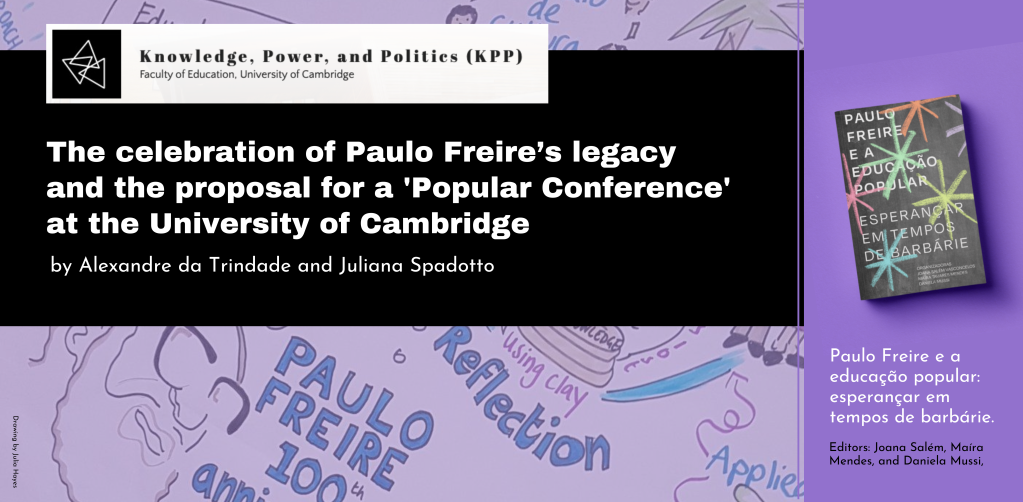
What could a conference on popular education be, based on the ideas of popular education and Paulo Freire?
The second edition of the Freire Conference, “Building the bridge between popular education and university”, which took place between 17 and 21 October at the Faculty of Education at the University of Cambridge and in two academic institutions in Rio de Janeiro, Brazil, was an experience in that sense. It was an initiative organised by a collective of people based in multiple educational institutions and social movements which proposes to broaden the limits and cross the barriers that separate the academic communities (particularly those belonging to the most traditional and hegemonic institutions) from education and popular knowledge by promoting meetings, relationships and democratic spaces that have in common a striving for transformation and social justice.
The first edition of this conference took place in 2021, the year in which the birth centenary of educator Paulo Freire was celebrated. It emerged from a provocative challenge: to think and carry out a “popular conference”, which had its foundations and values based on Freire’s idea of “popular education”. For the Brazilian educator, popular education is carried out with the people, the oppressed or the marginalised classes, from a particular conception of a liberating, political and ethical education. An education oriented to the transformation of society which starts from the concrete and lived context to reach the theoretical context, requiring epistemological curiosity, problematisation, rigorousness, creativity, dialogue, the experience of the praxis and the protagonism of the subjects.
In this sense, a popular education conference proposal should be (i) essentially dialogical, rather than the typical academic-expository one in which the transfer of knowledge in a unilateral way is predominant; (ii) it must overcome meritocratic proposal selection criteria that assume that some knowledge is more important and valid than others and therefore deserves to be ‘selected or chosen’; and (iii) should break the hegemonic barriers of language, access, format or perspective that exclude or discourage the participation of individuals and groups marginalised by academia due to various limitations – in this way, actions concerned with accessibility and the free access to educational spaces must be a priority.
Based on those principles and purpose, the Cambridge Latin American Research in Education Collective (CLAREC) and the Brazilian popular education social movement Universidade Emancipa developed the 1st Freire Conference, “The Thoughts of Paulo Freire in the Current Research in Education”, at the University of Cambridge. That experience is described and shared by CLAREC members Alexandre da Trindade and Juliana Spadotto in a chapter of the book “Paulo Freire e a educação popular: esperançar em tempos de barbárie” (Paulo Freire and popular education: hope in times of barbarism) organised by Joana Salém, Maíra Mendes, and Daniela Mussi, to be launched in Portuguese in December 2022. This chapter has been translated into English and is now available at the Knowledge, Power, and Politics (KPP) Blog.
This question has stimulated us, the Cambridge Latin American Research in Education Collective (CLAREC) and the Universidade Emancipa, in the last two years.
Today it is one month since the second edition of the Freire Conference, “Building the bridge between popular education and the university“, took place – an educational experience that hoped to meet this challenge. The experience of the first edition of the Conference, which took place online and at the University of Cambridge in 2021, the year of the centenary of Paulo Freire’s birth, is shared by CLAREC members Alexandre da Trindade and Juliana Spadotto in a chapter of the book “Paulo Freire e a educação popular: esperançar em tempos de barbárie” (Paulo Freire and popular education: hope in times of barbarism) organised by Joana Salém, Maíra Mendes, and Daniela Mussi, to be launched in Portuguese in December 2022. This chapter has been translated into English and is now available at the Knowledge, Power, and Politics (KPP) Blog.
To find out more about the book and how to buy it, please access here.
✍🏻 Drawing made by CLAREC Member Julia Hayes during the I Freire Conference.

This piece was originally published at Faculty of Education webpage.
Local activists, enterprises, artists, charities and community groups will be involved in an exchange of cultural activities and discussions on 19 October, organised by students at the University of Cambridge’s Faculty of Education.
The event will make the Faculty an open, shared space for the day, where community representatives and academics can discuss various local issues and, it is hoped, kick-start lasting collaborations to achieve positive change in the area.
The takeover is part of an annual conference celebrating Paulo Freire, the influential Brazilian educator. Its organisers are a group of Latin American students, who are drawing inspiration from Freire’s ideas about ‘popular education’.
Popular education is a relatively familiar concept in Latin America, but has not been tried at a British university before. Unlike the formal education that takes place in schools, popular education – which often happens with adults as well as children – is shaped by the participants themselves. It often starts from people’s personal experiences of various political and social problems, and aims to empower them to work together towards solutions. Everyone teaches and learns from each other as they strive towards these goals.
The Cambridge event has been particularly inspired by Rede Emancipa: a Brazilian social justice movement which defends the right to education for all. A simultaneous ‘takeover’ will be happening at the Federal University of Rio De Janeiro, with the two institutions linking up through a live stream. More than 2,000 people have signed up for the joint events.
If we can start a meaningful dialogue about issues around which we can unite, the university will become a space that belongs to everyone.
The Cambridge side will involve groups such as Arthur Rank Hospice, Cambridge Ethnic Community Forum and Cambridge Women’s Resources Centre. The programme is part-conference, part-community festival, involving live performances, showcases by local artists and independent street food traders. There will be various activities, drawing on a range of established approaches to facilitating popular education, and aimed at starting open conversations on how to improve the wider Cambridge community.
The emphasis will be on local difficulties with inequality, marginalisation and social exclusion. Cambridge has been identified as Britain’s least equal city. Although it is extremely prosperous thanks to its universities and the closely-linked tech and biomedical clusters, the top 6% of earners take home almost one fifth of the income generated, while the bottom 20% earn just 2% of the total.
The University already has a thriving range of community engagement projects, but the students hope that popular education might add an extra dimension to those efforts. In Latin America, this often involves allowing educational institutions like universities to be symbolically ‘reterritorialised’ by the local community, to stimulate new ideas about working together.
Heidy Perez-Cordero, a PhD student from the Cambridge Latin American Research in Education Collective (CLAREC), said: “These sorts of exchanges are quite common in countries like Brazil, Mexico and Chile. We are interested in how they might work here. Cambridge is a deeply unequal place, and we have a responsibility to make the university a resource that people can draw on in ways that matter to them. The idea is that if we can start a meaningful dialogue about issues around which we can unite, the university will become a space that belongs to everyone.”
Rede Emancipa – the event’s principal source of inspiration – began in Sao Paolo in 2007, and initially involved running free, pre-university courses for people on low incomes, those with disabilities, ethnic minorities and others. It now has a presence across Brazil, and its mission has evolved to support communities by advancing causes or agendas which matter to them.
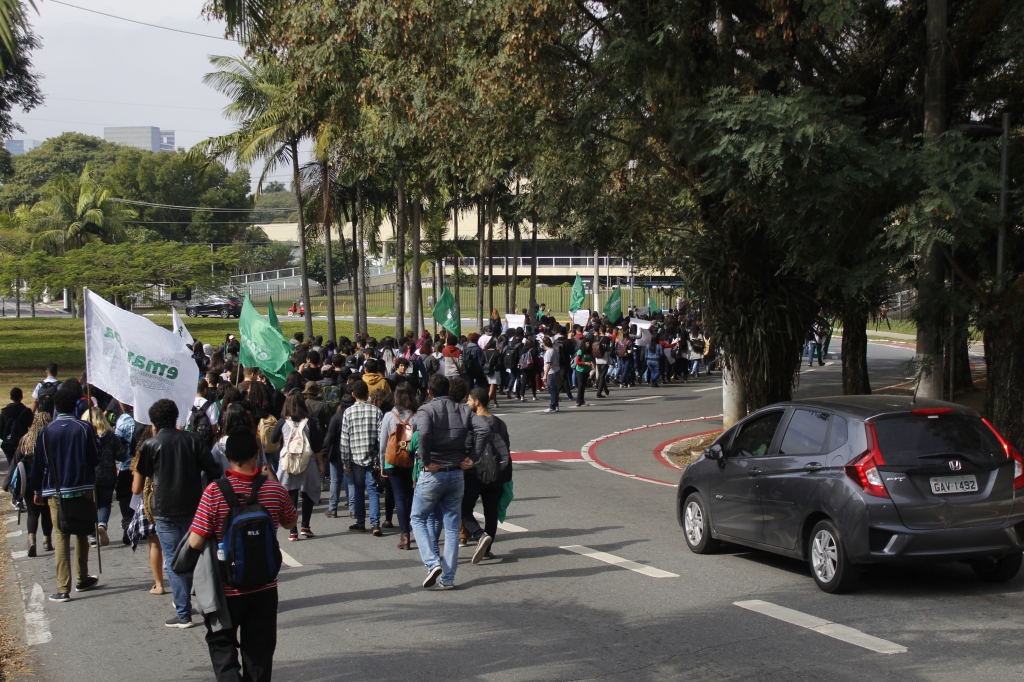
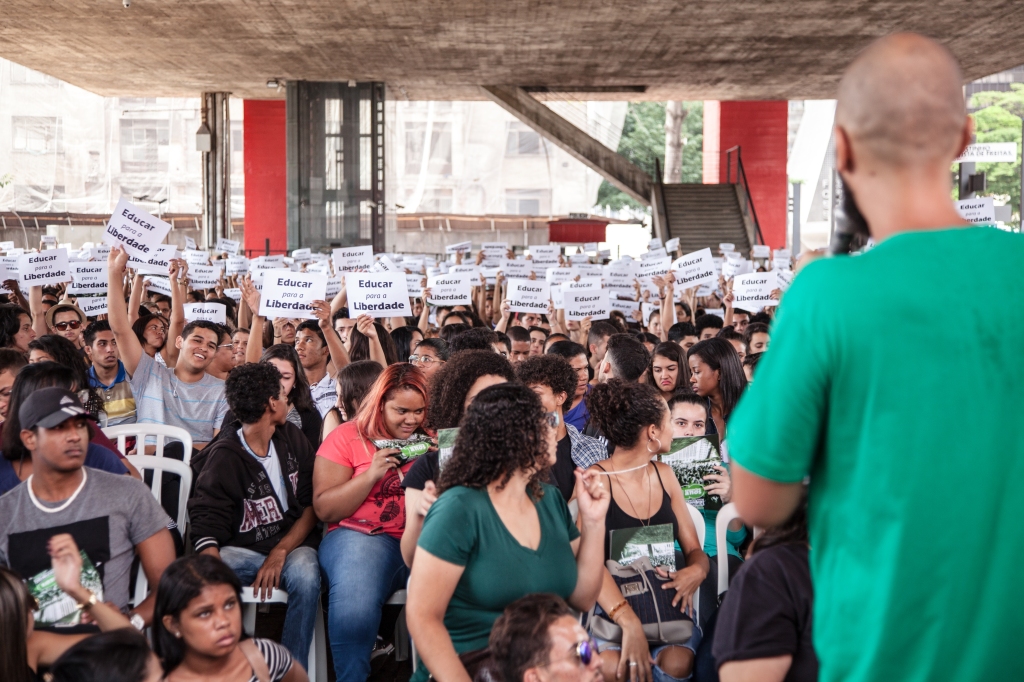

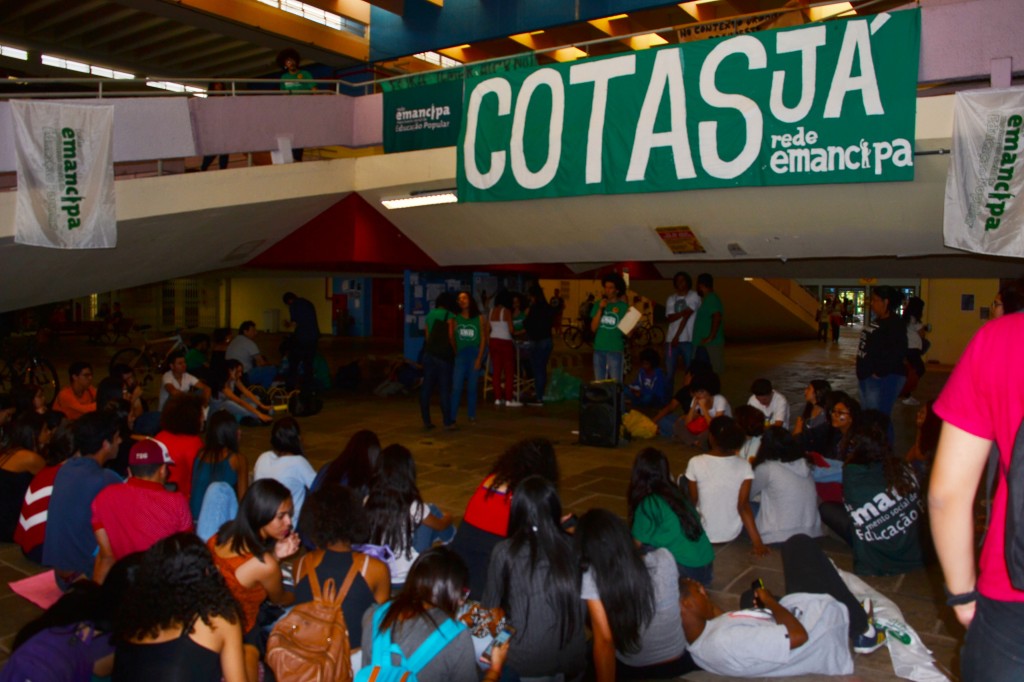

Maíra Tavares Mendes, an Associate Professor at the State University of Santa Cruz, Brazil, who is co-organising the Freire conference, said: “The key thing Rede Emancipa does is organise. It starts when a group of people want to achieve something – say, a sports project, or an education programme for children. Rede Emancipa brings together different resources in the community to help achieve that goal. Universities are obviously centres of expertise, but they are also places where people can get together and organise in this way.”
The programme for the event has been structured by studying the methods of other successful popular education movements – such as the Popular University of Social Movements (UPMS), which was created at the 2003 World Social Forum.
Some of their techniques will be used to stimulate a semi-structured community dialogue: an open discussion about what the different participants do, the challenges they face, and how they might work together. The plan is to open this with a mistica: a form of ritual in which people express the ambitions and ideas that brough them to the event, which helps to set the terms of the discussion. There will also be exhibitions of local artists’ and craftspeoples’ work, and a sarau – a gathering aimed at sharing different cultural traditions and ideas through dance, music, performance and poetry.
Organisers see the event as having potential mutual benefits for all involved. While local activists and advocacy groups may find ways to draw on the academic expertise on their doorstep, educationalists and social scientists from the Faculty will be able to meet people whose experiences interlink with their own research.
The problem with unequal societies is that problems tend to get processed individually. The greatest benefits come when instead we use shared spaces to bring people together.
Ila Chandavarkar, who is chair of the Cambridge Women’s Resource Centre, said: “We don’t really know what’s going to happen, but what I like about the concept is that it opens up possibilities.”
“Cambridge is so divided and we miss a trick by not joining forces more often. The women in our centre, for example, have a wealth of lived experience that can inform academic research, just as much as academics might be able to help them to change things on a wider scale. The problem with unequal societies is that problems tend to get processed individually. The greatest benefits come when instead we use shared spaces to bring people together, and use their complementary skills and knowledge to collaborate towards change that is needed.”
More information about the 2022 Freire events can be found on the CLAREC website.
Images in this story:
Images of Rede Emancipa events, University of Sao Paolo, 2017-19, by kind permission of the Rede Emancipa archive.
The “II Freire Conference: Building the bridge between popular education and university”, organised by the Cambridge Latin American Research in Education Collective (CLAREC) and Universidade Emancipa, took place between the 17th and 21st of October 2022. It was an international, multicultural, and interdisciplinary initiative organised by a collective of people based in multiple academic institutions and social movements. Access on CLAREC YouTube Channel the playlist with the recording of the conference activities.


Watch the panel and discussion of the thought-provoking event “The role of education in the fake news era” organised by CLAREC at the Faculty of Education
Click below to watch our past CLAREC Whereabouts Seminars.
Want to join CLAREC or know what is going on? Follow us on Instagram, Twitter, Facebook
We are extremely grateful to the Faculty’s community and all our partners for embracing the CLAREC project “Paulo Freire 100th Anniversary: Celebrating his legacy in education” by collaborating and supporting us in every step of this two-week journey of celebration of Freire’s legacy. Having made it possible for us to install a Freire sculpture at the University of Cambridge is a milestone that will surely inspire others to go further in the dream of making education a viable means of dialogue, love and social transformation. The message published by the Faculty makes us feel more motivated to follow our dreams for a more inclusive, emancipated, and transformative Education. Let us listen to Freire’s call to create a safe space to foster dialogue and together aim for Liberation.
CLAREC, 2021




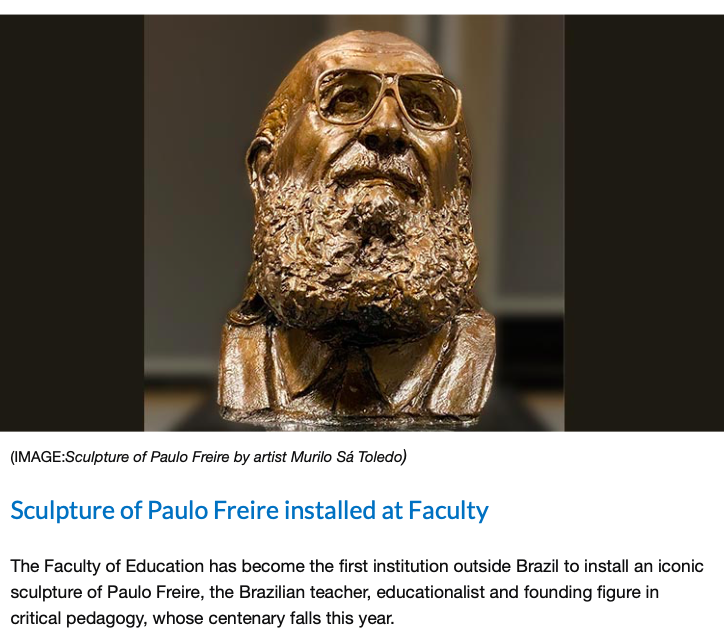

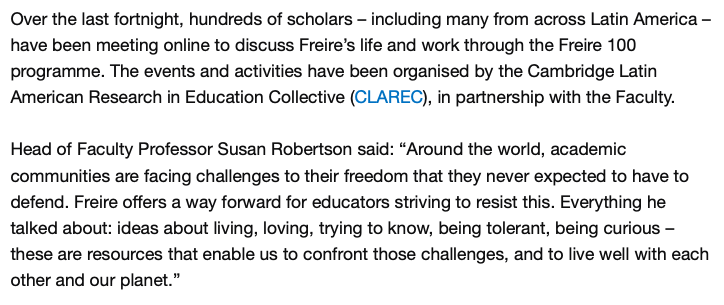
- II Freire Conference: Building the bridge between popular education and university named Event of the Year by the Cambridge Students’ Awards 2023II Freire Conference: Building the bridge between popular education and university named Event of the Year by the Cambridge Students’ Awards 2023
- The celebration of Paulo Freire’s legacy and the proposal for a Popular Conference at the University of CambridgeOriginally posted on KNOWLEDGE, POWER, AND POLITICS:
Alexandre da Trindade[1] Juliana Spadotto[2] What could a conference on popular education be, based on the ideas of popular education and Paulo Freire? This question has stimulated us in the last two years. The?second edition of the Freire Conference, “Building the bridge between popular education and university”, which… - Paulo Freire’s 100th Birthday: Celebrating his legacy in educationby Paula Teixeira de Castro and Sebastián Ansaldo Paulo Freire is currently being celebrated for his 100th Anniversary, and the Pedagogy of the Oppressed has now more than fifty years since its original release. Considering that half a century has passed, his theory and concepts still retain a profound influence and global impact. In 2016, anContinue reading “Paulo Freire’s 100th Birthday: Celebrating his legacy in education”
- On digital teaching and the neoliberal machineOriginally posted on The post-pandemic university:
Espen Hektoen This is part of a special collection celebrating the?centenary of Paulo Freire’s birth. Paulo Freire‘s conscientization is becoming even more important in an age where discourses about students as consumers dominates pedagogical paradigms, and social consequences, as Henry Giroux points to, are blanketed by notions of pedagogical… - Challenging non-democracy through participation: Can the classroom be a place of resistance?Originally posted on The post-pandemic university:
Gaston Bacquet This is part of a special collection celebrating the?centenary of Paulo Freire’s birth. Almost a century ago, when arguing for what he believed to be the need for democratic participation within learning spaces, John Dewey stated that democracy in the way he envisioned is: “…more than a… - ‘Education is freedom’ – turning the rhetoric of inclusion into actionOriginally posted on The post-pandemic university:
Stephen Thompson This is part of a special collection celebrating the?centenary of Paulo Freire’s birth. Paulo Freire is often quoted as saying education is freedom. Education in general has changed drastically in the 100 years since he was born, yet questions remain as to whether these changes are moving… - Classrooms as a space for imagination and hopeOriginally posted on The post-pandemic university:
Patric Wallin This is part of a special collection celebrating the centenary of Paulo Freire’s birth. Where do we go from here? From a situation where students shop courses, teachers measure satisfaction, and everyone complains about everything. From universities that proclaim that they are at the forefront of working… - Call for Blog Posts: Paulo Freire’s 100th Anniversary, organised by CLARECOriginally posted on The post-pandemic university:
This year marks the centenary of the birth of one of the greatest thinkers in education: Paulo Freire. Paulo Freire’s work has globally influenced people working in education, community development, community health, communications, and many other fields. In particular, his best-known book Pedagogy of the Oppressed is considered to… - Autism and Culture: Shaping autism research based on experiences with the autistic communities in Mexico and the UKAna Laura Trigo Clapés is a PhD student in the Faculty of Education, University of Cambridge (CLAREC member) This post was originally published at FERSA University of Cambridge Blog This piece is part of the Autism and Culture series, in which researchers at the Faculty of Education carrying out studies relating to autism across the globe reflectContinue reading “Autism and Culture: Shaping autism research based on experiences with the autistic communities in Mexico and the UK”
- CLAREC – The new Cambridge Latin American Research in Education CollectiveThis post was originally published at Faculty of Education webpage. Just a few months after its official formation, Cambridge’s new Latin American Research in Education Collective (CLAREC) is attracting widespread interest and engagement – and not just from within Cambridge. Through a thriving programme of talks, research seminars and a reading group, the collective aimsContinue reading “CLAREC – The new Cambridge Latin American Research in Education Collective”
- The functions of Education and reflections on the role of researchers engaged in an academic collectiveAlexandre da Trindade, Second-Year PhD Student, Faculty of Education, University of Cambridge (CLAREC member) This post was originally published at ESRC DTP Cambridge webpage. In October 2020, a group of PhD students from the Faculty of Education at the University of Cambridge founded the Cambridge Latin American Research in Education Collective (CLAREC) aiming to makeContinue reading “The functions of Education and reflections on the role of researchers engaged in an academic collective”
- Carving space for multiple knowledges in HE
Consuelo Béjares, Ph.D. Student, Faculty of Education, University of Cambridge
Becoming a doctoral student at Cambridge University means entering a different world for most Latin Americans. Even if you were privileged enough back home to be able to be accepted in Cambridge and secure funding, the level of privilege, wealth, and intellectual elitism that we confront here was unknown for most of us. This strikes me from the first moment in the form of feeling out of place — not intelligent enough, not well-read enough, not confident enough, not very “Cambridge” in sum.
“The Decolonial Epistemic Turn and The Idea of Latin America – A conversation with Prof. Walter Mignolo”.
The Cambridge Latin American Research in Education Collective, with the support of the Centre of Latin American Studies (CLAS) and the Faculty of Education, University of Cambridge, presents a conversation with Prof. Walter Mignolo, William Hane Wannamaker Distinguished Professor of Romance Studies at Duke University, and a key thinker of the decolonial project. The conversation focus on Prof. Mignolo’s perspective of the invention of Latin America and the possibilities of the decolonial epistemic turn in the present. You can watch below this conversation that took place on April 26, 2021. See the Q&A and chat of this event here.




